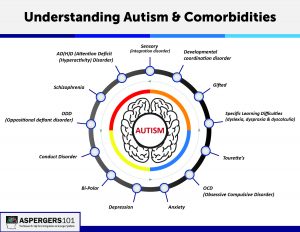Over the years one question is always asked at the end of every autism workshop Sam and I have been privileged to present. To paraphrase, it goes like this:
The Question:
“Sam this question is for you. We just found out our teenage son has (this part she whispers) Autism. I am unsure whether to tell him, his siblings or anyone else for that matter. What are your thoughts…should we tell?”

Since the question is directed at Sam…all eyes are on him waiting his response. For this reference, the woman asking the question is a composite of all the mothers who’ve asked this of Sam more times than I can count. She stands with tears in her eyes and is truly grappling with the recent diagnosis of Autism yet has hope after hearing Sam talk about growing up on the spectrum. She relates, she hurts and she hopes. So answering this common question takes thought. Samuels response is why I am writing this post. It comes straight from the heart of a young man who understands what autism ‘feels’ like. He is able to offer an insight, perhaps, into her own sons inner workings, workings that the parent has yet to grasp.
So when Sam, on his own, offered up his opinion it seemed appropriate to share with you now as it always seems to sooth the inquiring Moms fears.
The Response:
“Why would you not tell your son of his diagnosis? Believe me, he knows he is wired differently. He already knows he is not like his peers and probably feels like an outcast. It might even be a relief to know he has autism as there will finally be an explanation for most everything he is experiencing such as frustration, social loss and even physical pain. At the very least, he (and you) can begin to face the challenges through treatment(s). The diagnosis of autism isn’t a death sentence. It’s a road map of the brain. Understand the brain and map out a direction. Don’t think of Autism as a weight…think of it as a pair of wings in which to fly. ”
Inevitably, the Mom appears relieved and hugs Sam as if to thank him for permission to let the word, Autism, come into their lives. I know because we started from the same place.
Understand that the diagnosis of Autism is just the start. More often than not, autism is not the challenges as much as the comorbidities that surround the diagnosis. Comorbidities means co-existing conditions. So these challenges may include (alongside autism) attention deficit disorder, sensory issues, fine and gross motor skills, hyperactivity, bipolar, obsessive-compulsive disorder, anxiety and more. This is why is it imperative to acknowledge the diagnosis of autism. The challenges are real and once accepted and studied and diagnosed, then you can prepare your child to be all they can in adulthood.

Burying your head in the sand does not make the autism ‘go away’. Nor does it help the child grow into an adult armed with the tools to function in spite of these conditions. If it’s the label of autism that worries you, limit who you tell but know it’s a false friendship and chances are, they already sense something is different anyway.
By embracing the diagnosis (and your child) you are choosing to understand their brain and its function. It’s an interesting journey that I’m still exploring! You will not only better communicate with your child to help avoid meltdowns, you will learn what is causing the meltdown in the first place and avoid those scenarios. That in itself is a HUGE hurdle that offers relief during the educational years and will continue to aid in proper workplace environments.
It begins with acceptance. Once you do that, and overcome the perceived stigma of autism (basically, put your child first and public perception last) then together you can educate yourself on the brains unique wiring and how that translates to everyday living. It’s never too late to understand your own wiring, as Sam stated upon finally learning he had autism: “Now that I know what I’m dealing with (autism) it explains a lot!”
Want to learn more about the signs of High Functioning Autism or Asperger Syndrome? Go to our informal checklist here:
By: Jennifer Allen
Purchase the Poster designed by Sam that answers the question: “How I Feel Living with Autism”

“I painted this abstract picture to show neurotypicals what it feels like to have Aspergers Syndrome. At the time, I was enrolled in Art Appreciation I at Northeast Lakeview College. One day after class, I was at home and suddenly felt like painting, so I got some brushes, a canvas, and some acrylic paint and began to paint while envisioning the picture and its message in my mind. The black and white background represents how aspies tend to see the world in a black-and-white perspective and that we tend to act monotonous. The colors inside the head represent how our minds are bursting with extraordinary ideas. The white lines above the head represent how when we try to say what’s on our minds, it tends to get distorted by our social awkwardness.” by: Samuel Allen
A graduate of Abilene Christian University, Jennifer had a long career in TV Broadcasting. Upon learning her oldest son Sam had a form of Autism called Asperger’s Syndrome, she left her career and became a full-time mother to both of her sons. Jennifer elicited the participation of her family and together they produced several independent programs including a children’s animated series titled Ameriquest Kids, as well as a documentary and book titled, Coping to Excelling: Solutions for School-age Children Diagnosed with High-Functioning Autism or Aspergers Syndrome. She formed the nonprofit Asperger101 to provide on-going free resources related to ASD at Aspergers101.com and has implemented the Texas Driving with Disability Program and continues to grow the statewide initiative today. She and her husband have recently retired to their property in the Texas Hill Country.


My grandson definately showing signs of autism and he is 2 and a few months old … I as Grammy have seen signs of it since his 1st birthday ….. super hard to see and there is more to the story …. he is our rainbow baby as his brother was dead in womb at 41 weeks and my daughter was forced to give birth to her first son under dramatic circumstances